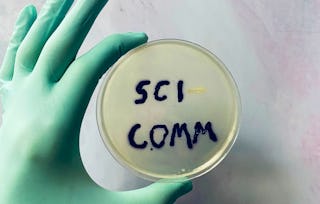In this course, you will continue to explore how to develop and implement evidence-based methods for science communication. Here we’ll be looking at the softer but no less important side of science communication. We’ll cover the basics of human emotion, building connection with your audience through empathy and authenticity, how improv can improve your science communication game, non-verbal communication, and managing adversity in science communication. We’ll close with a discussion of how to be an inclusive and trauma-informed science communicator.

Gain next-level skills with Coursera Plus for $199 (regularly $399). Save now.

The Softer Side of Science Communication
This course is part of Designing Effective Science Communication Specialization

Instructor: Melanie Peffer
Included with
Recommended experience
What you'll learn
Explain the role of emotion in human behavior and how it can come up in science communication.
Explain why authenticity, trust, and empathy will help foster connection and consequently science communication.
Explain how improvisation, storytelling, and nonverbal communication can improve your science communication activities.
Describe how to be an inclusive and trauma informed science communicator.
Skills you'll gain
Details to know

Add to your LinkedIn profile
See how employees at top companies are mastering in-demand skills

Build your subject-matter expertise
- Learn new concepts from industry experts
- Gain a foundational understanding of a subject or tool
- Develop job-relevant skills with hands-on projects
- Earn a shareable career certificate

There are 4 modules in this course
In this module, you will learn about human emotions.
What's included
4 videos3 readings1 assignment1 discussion prompt1 plugin
In this module, you will discuss the importance of fostering trust in science communication. We will also discuss how to use empathy, vulnerability, and authenticity to do so. Finally, the third part of this module will talk about the use of storytelling, improvisation and non-verbal communication to build connection with your audiences.
What's included
5 videos8 readings1 peer review3 discussion prompts
In this module, you will learn about conflict and science communication. We will also discuss strategies for managing active conflict and/or adversarial audiences.
What's included
3 videos1 reading1 assignment2 discussion prompts
In this module, we will discuss how to be inclusive science communicators. This includes how to be trauma informed, the balance of power in communication, designing for inclusion, and how to be culturally relevant. We'll close with a discussion of an ethical code for science communicators.
What's included
4 videos8 readings1 peer review2 discussion prompts
Earn a career certificate
Add this credential to your LinkedIn profile, resume, or CV. Share it on social media and in your performance review.
Instructor

Offered by
Explore more from Education
 Status: Free Trial
Status: Free TrialUniversity of Colorado Boulder
 Status: Preview
Status: PreviewUniversity of Colorado Boulder
 Status: Free Trial
Status: Free TrialUniversity of Colorado Boulder
 Status: Free Trial
Status: Free TrialUniversity of Colorado Boulder
Why people choose Coursera for their career





Open new doors with Coursera Plus
Unlimited access to 10,000+ world-class courses, hands-on projects, and job-ready certificate programs - all included in your subscription
Advance your career with an online degree
Earn a degree from world-class universities - 100% online
Join over 3,400 global companies that choose Coursera for Business
Upskill your employees to excel in the digital economy
Frequently asked questions
To access the course materials, assignments and to earn a Certificate, you will need to purchase the Certificate experience when you enroll in a course. You can try a Free Trial instead, or apply for Financial Aid. The course may offer 'Full Course, No Certificate' instead. This option lets you see all course materials, submit required assessments, and get a final grade. This also means that you will not be able to purchase a Certificate experience.
When you enroll in the course, you get access to all of the courses in the Specialization, and you earn a certificate when you complete the work. Your electronic Certificate will be added to your Accomplishments page - from there, you can print your Certificate or add it to your LinkedIn profile.
Yes. In select learning programs, you can apply for financial aid or a scholarship if you can’t afford the enrollment fee. If fin aid or scholarship is available for your learning program selection, you’ll find a link to apply on the description page.
More questions
Financial aid available,
¹ Some assignments in this course are AI-graded. For these assignments, your data will be used in accordance with Coursera's Privacy Notice.

